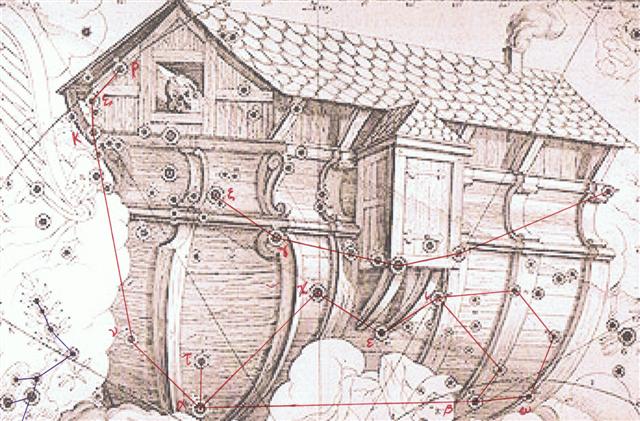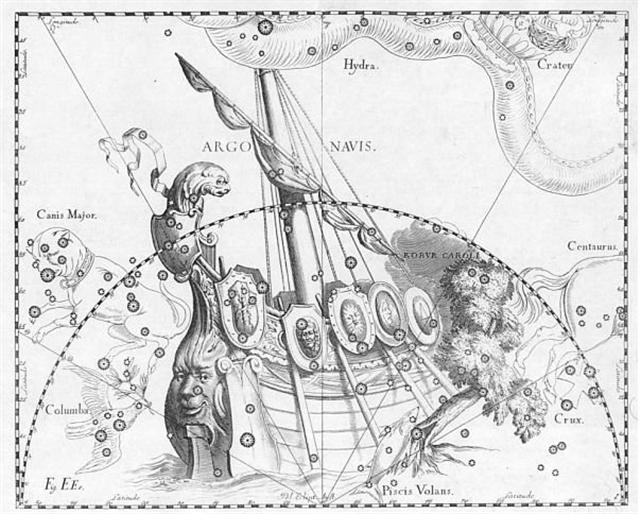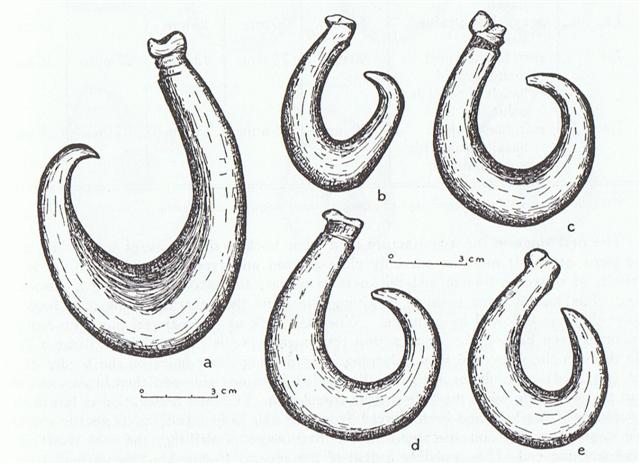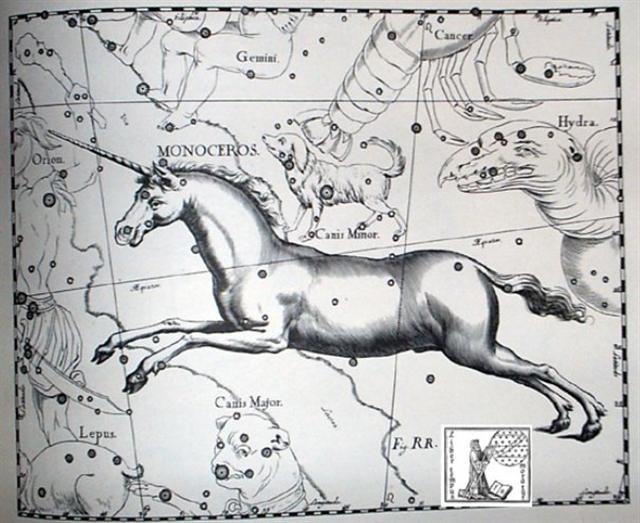Other
descriptions
of
reaching
Land
depicted
it
as
similar
to when
the
Ark
of
Noah
stranded
on
Ararat:

According
to
Manuscript
E it
was
Hotu
a
Matua
who
brought
with
him
onboard all
the varieties
of
the
necessary
food
crops
(yams,
sweet
potatoes,
sugarcane,
banana
shoots,
taro
etc)
later
to
be
distributed
on
Easter
Island.
And
to
secure
their
procreation
insects
were
not
forgotten.
Hevelius
has
a
profusion
of
details,
enough
for
an
encyclopedia:

In
Polynesian
mythology
Maui
fished
up
Land
from
Toga
and
probably
this
happened
when
Nunki
(the
star announcing
the
Sea)
was
close
to
the
Full
Moon:
... This [σ]
has been
identified
with
Nunki of
the
Euphratean
Tablet of
the Thirty
Stars,
the Star of
the
Proclamation
of the Sea,
this Sea
being the
quarter
occupied by
Aquarius,
Capricornus,
Delphinus,
Pisces, and
Pisces
Australis.
It is the
same space
in the sky
that Aratos
designated
as Water
...
 |
 |
| toga |
Ga2-2 |
| Toga 1. Winter season. Two seasons used to be distinguished in ancient times: hora, summer, and toga, winter. 2. To lean against somehing; to hold something fast; support, post supporting the roof. 3. To throw something with a sudden movement. 4. To feed oneself, to eat enough; e-toga koe ana oho ki te aga, eat well first when you go to work. Vanaga.
1. Winter. P Pau., Mgv.: toga, south. Mq.: tuatoka, east wind. Ta.: toa, south. 2. Column, prop; togatoga, prop, stay. Togariki, northeast wind. Churchill.
Wooden platform for a dead chief: ka tuu i te toga (Bb8-42), when the wooden platform has been erected. Barthel 2.
The expressions Tonga, Kona, Toa (Sam., Haw., Tah.), to indicate the quarter of an island or of the wind, between the south and west, and Tokelau, Toerau, Koolau (Sam., Haw., Tah.), to indicate the opposite directions from north to east - expressions universal throughout Polynesia, and but little modified by subsequent local circumstances - point strongly to a former habitat in lands where the regular monsoons prevailed. Etymologically 'Tonga', 'Kona', contracted from 'To-anga' or 'Ko-ana', signifies 'the setting', seil. of the sun. 'Toke-lau', of which the other forms are merely dialectical variations, signifies 'the cold, chilly sea'. Fornander. |
 |
 |
 |
 |
 |
| Ga1-30 |
Ga2-1 |
Ga2-2 |
Ga2-3 (33) |
Ga2-4 |
| APRIL 20 (110) |
21 (*31) |
22 |
23 |
24 (*399) |
| Furud (94.9) |
Well-22 / Arkū-sha-pu-u-mash-mashu-9 |
no star listed (96) |
β Monocerotis, ν Gemini (97.0) |
no star listed (98) |
| δ Columbae (95.2), TEJAT POSTERIOR, Mirzam (95.4), CANOPUS (95.6), ε Monocerotis (95.7), ψ1 Aurigae (95.9) |
| June 23 (6 * 29 = 174) |
ST JOHN'S EVE |
25 |
26 (6 * 29½ = 177) |
27 |
| ºJune 19 |
20 (*91) |
SOLSTICE |
22 |
23 |
| 'May 27 (7 * 21 = 147) |
28 (*68) |
29 |
30 |
31 |
| "May 13 (7 * 19 =133) |
14 |
15 (*55) |
16 (136) |
17 |
| NAKSHATRA DATES: |
| OCTOBER 20 |
21 (*214) |
22 (295) |
23 |
24 |
| Purva Ashadha-20 |
Kaus Borealis (279.3) |
ν Pavonis (280.4), κ Cor. Austr. (280.9) |
Abhijit-22 |
| KAUS MEDIUS, κ Lyrae (277.5), Tung Hae (277.7) |
φ Oct. (278.1), KAUS AUSTRALIS (278.3), ξ Pavonis (278.4), Al Athfar (278.6) |
θ Cor. Austr. (281.0), VEGA (281.8) |
| December 23 |
CHRISTMAS EVE |
25 |
26 (360) |
27 |
| ºDec 19 (*273) |
20 |
SOLSTICE |
22 |
23 (357) |
| 'November 26 |
27 |
28 |
29 (333) |
30 (*254) |
| "November 12 (*236) |
13 |
14 |
15 |
16 (320) |
 |
 |
 |
 |
| Ga2-5 |
Ga2-6 |
Ga2-7 |
Ga2-8 |
| APRIL 25 (*400) |
26 (*36) |
27 |
28 (118) |
| ν Puppis (99.2), ψ3 Aurigae (99.4), ψ2 Aurigae (99.5)
Gemma
|
ψ4 Aurigae (100.5), Mebsuta (100.7) |
TE POU (101.2), ψ5 Aurigae (101.4), ν Gemini (101.6), ψ6 Aurigae (101.7) |
τ Puppis (102.2), ψ7 Aurigae (102.4) |
| June 28 |
29 |
30 |
July 1 (182) |
| ST JOHN'S EVE |
ºJune 25 |
26 (177) |
27 |
| 'June 1 (*72) |
2 |
3 |
4 |
| "May 18 (*58) |
19 |
20 (140) |
21 |
| NAKSHATRA DATES: |
| OCTOBER 25 |
26 |
27 (300) |
28 (*221) |
| no star listed (282) |
ζ Pavonis (283.4), λ Cor. Austr. (283.6), Double Double (283.7), ζ Lyrae (283.8) |
South Dipper-8 |
Sheliak, ν Lyrae (285.1), λ Pavonis (285.7)
Atlas
|
| Φ SAGITTARII (284.0), μ Cor. Austr. (284.6), η Cor. Austr., θ Pavonis (284.8) |
| December 28 |
29 |
30 (364) |
31 |
| CHRISTMAS EVE |
ºDecember 25 |
26 (360) |
27 |
| 'December 1 |
2 |
3 (*257) |
4 |
| "November 17 |
18 |
19 |
20 (324) |
 |
 |
 |
 |
| Ga2-9 |
Ga2-10 (40) |
Ga2-11 |
Ga2-12 |
| APRIL 29 (*39) |
30 |
MAY 1 (121) |
2 (*407) |
| Mash-mashu-sha-Risū-10 |
Adara (104.8) |
ω Gemini (105.4), Alzirr (105.7), Muliphein (105.8), Mekbuda (105.9) |
7h (106.5) |
| θ Gemini (103.0), ψ8 Aurigae (103.2), Alhena (103.8), ψ9 Aurigae (103.9) |
no star listed (106) |
| July 2 |
3 |
4 (185) |
5 |
| ºJune 28 |
29 (*100) |
30 |
ºJuly 1 (182) |
| 'June 5 |
6 |
7 (*78) |
8 |
| "May 22 |
23 |
24 (144) |
25 (*65) |
| NAKSHATRA DATES: |
| OCTOBER 29 (*222) |
30 |
31 |
NOVEMBER 1 (305) |
| χ Oct. (286.0), Ain al Rami (286.2), δ Lyrae (286.3), κ Pavonis (286.5), Alya (286.6) |
ξ Sagittarii (287.1), ω Pavonis (287.3), ε Aquilae, ε Cor. Austr., Sulaphat (287.4), λ Lyrae (287.7), Ascella, Bered (Ant.) (287.9) |
Al Na'ām-18 / Uttara Ashadha-21 |
19h (289.2) |
| NUNKI (288.4), ζ Cor. Austr. (288.5), Manubrium (288.8), ζ Aquilae (288.9) |
λ Aquilae (Ant.) (289.1), γ Cor. Austr (289.3), τ Sagittarii (289.4), ι Lyrae (289.5), δ Cor. Austr. (289.8) |
| January 1 (366) |
2 |
3 |
4 |
| ºDecember 28 |
29 |
30 (364) |
31 (*285) |
| 'December 5 |
6 |
7 |
8 (342) |
| "November 21 (325) |
22 |
23 |
24 (*248) |
Possibly
the
question
mark
in
Allen
regarding
the
meaning
of
Risū
in
the
name
of
the
10th
(half
20)
Babylonian
ecliptic
station
can
be
eliminated
by
changing
his
'Shepherd'
to
the
Hindu
Rishi.
The
suggestive
opening
in
Ga2-10
is
like
a
mouth.
...
The
Pythagoreans
make
Phaeton
fall
into
Eridanus,
burning
part
of
its
water,
and
glowing
still
at
the
time
when
the
Argonauts
passed
by.
Ovid
stated
that
since
the
fall
the
Nile
hides
its
sources.
Rigveda
9.73.3
says
that
the
Great
Varuna
has
hidden
the
ocean.
The
Mahabharata
tells
in
its
own
style
why
the
'heavenly
Ganga'
had
to
be
brought
down.
At
the
end
of
the
Golden
Age
(Krita
Yuga)
a
class
of
Asura
who
had
fought
against
the
'gods'
hid
themselves
in
the
ocean
where
the
gods
could
not
reach
them,
and
planned
to
overthrow
the
government.
So
the
gods
implored
Agastya
(Canopus,
alpha
Carinae
=
Eridu)
for
help.
The
great
Rishi
did
as
he
was
bidden,
drank
up
the
water
of
the
ocean,
and
thus
laid
bare
the
enemies,
who
were
then
slain
by
the
gods.
But
now,
there
was
no
ocean
anymore!
Implored
by
the
gods
to
fill
the
sea
again,
the
Holy
One
replied:
'That
water
in
sooth
hath
been
digested
by
me.
Some
other
expedient,
therefore,
must
be
thought
of
by
you,
if
ye
desire
to
make
endeavour
to
fill
the
ocean
...
In
Ga2-11
we
can
recognize
a
fish-hook
and
according
to
the
Gregorian
calendar
the
nakshatra
date
was
ºDecember
30
(364)
-
i.e.
4
precessional
days
later
than
heliacal
Sirius
(Te
Pou).

...
Boastful
Maui
behaved
as
if
it
were
a
very
ordinary
sort
of
fish-hook,
and
flashed
it
carelessly.
Then
he
asked
his
brothers
for
some
bait.
But
they
were
sulking,
and
had
no
wish
to
help
him.
They
said
he
could
not
have
any
of
their
bait.
So
Maui
atamai
doubled
his
fist
and
struck
his
nose
a
blow,
and
smeared
the
hook
with
blood,
and
threw
it
overboard.
'Be
quiet
now,'
he
told
his
brothers.
'If
you
hear
me
talking
to
myself
don't
say
a
word,
or
you
will
make
my
line
break.'
And
as
he
paid
out
the
line
he
intoned
this
karakia,
that
calls
on
the
north-east
and
south-east
winds:
Blow
gently,
whakarua,
/
blow
gently,
mawake,
/ my
line
let
it
pull
straight,
/ my
line
let
it
pull
strong.
My
line
it
is
pulled,
/ it
has
caught,
/ it
has
come.
The
land
is
gained,
/
the
land
is
in
the
hand,
/
the
land
long
waited
for,
/
the
boasting
of
Maui,
/
his
great
land
/
for
which
he
went
to
sea,
/
his
boasting,
it
is
caught.
A
spell
for
the
drawing
up
of
the
world.
The
brothers
had
no
idea
what
Maui
was
up
to
now,
as
he
paid
out
his
line.
Down,
down
it
sank,
and
when
it
was
at
the
bottom
Maui
lifted
it
slightly,
and
it
caught
on
something
which
at
once
pulled
very
hard.
Maui
pulled
also,
and
hauled
in a
little
of
his
line.
The
canoe
heeled
over,
and
was
shipping
water
fast.
'Let
it
go!'
cried
the
frightened
brothers,
but
Maui
answered
with
the
words
that
are
now
a
proverb:
'What
Maui
has
got
in
his
hand
he
cannot
throw
away.'
'Let
go?'
he
cried.
'What
did
I
come
for
but
to
catch
fish?'
And
he
went
on
hauling
in
his
line,
the
canoe
kept
taking
water,
and
his
brothers
kept
bailing
frantically,
but
Maui
would
not
let
go.
Now
Maui's
hook
had
caught
in
the
barge-boards
of
the
house
of
Tonganui,
who
lived
at
the
bottom
of
that
part
of
the
sea
and
whose
name
means
Great
South;
for
it
was
as
far
to
the
south
that
the
brothers
had
paddled
from
their
home.
And
Maui
knew
what
it
was
that
he
had
caught,
and
while
he
hauled
at
his
line
he
was
chanting
the
spell
that
goes:
O
Tonganui
/
why
do
you
hold
so
stubbornly
there
below?
The
power
of
Muri's
jawbone
is
at
work
on
you,
/
you
are
coming,
/
you
are
caught
now,
/
you
are
coming
up,
/
appear,
appear.
Shake
yourself,
/
grandson
of
Tangaroa
the
little.
The
fish
came
near
the
surface
then,
so
that
Maui's
line
was
slack
for
a
moment,
and
he
shouted
to
it
not
to
get
tangled.
But
then
the
fish
plunged
down
again,
all
the
way
to
the
bottom.
And
Maui
had
to
strain,
and
haul
away
again.
And
at
the
height
of
all
this
excitement
his
belt
worked
loose,
and
his
maro
fell
off
and
he
had
to
kick
it
from
his
feet.
He
had
to
do
the
rest
with
nothing
on.
The
brothers
of
Maui
sat
trembling
in
the
middle
of
the
canoe,
fearing
for
their
lives.
For
now
the
water
was
frothing
and
heaving,
and
great
hot
bubbles
were
coming
up,
and
steam,
and
Maui
was
chanting
the
incantation
called
Hiki,
which
makes
heavy
weights
light.
At
length
there
appeared
beside
them
the
gable
and
thatched
roof
of
the
house
of
Tonganui,
and
not
only
the
house,
but
a
huge
piece
of
the
land
attached
to
it.
The
brothers
wailed,
and
beat
their
heads,
as
they
saw
that
Maui
had
fished
up
land,
Te
Ika
a
Maui,
the
fish
of
Maui.
And
there
were
houses
on
it,
and
fires
burning,
and
people
going
about
their
daily
tasks.
Then
Maui
hitched
his
line
round
one
of
the
paddles
laid
under
a
pair
of
thwarts,
and
picked
up
his
maro,
and
put
it
on
again
...
| Maro Maro: A sort of small banner or pennant of bird feathers tied to a stick. Maroa: 1. To stand up, to stand. 2. Fathom (measure). See kumi. Vanaga.
Maro: 1. June. 2. Dish-cloth T P Mgv.: maro, a small girdle or breech clout. Ta.: maro, girdle. Maroa: 1. A fathom; maroa hahaga, to measure. Mq.: maó, a fathom. 2. Upright, stand up, get up, stop, halt. Mq.: maó, to get up, to stand up. Churchill.
Pau.: Maro, hard, rough, stubborn. Mgv.: maro, hard, obdurate, tough. Ta.: mârô, obstinate, headstrong. Sa.: mālō, strong. Ma.: maro, hard, stubborn. Churchill.
Ta.: Maro, dry, desiccated. Mq.: mao, thirst, desiccated. Fu.: malo, dry. Ha.: malo, maloo, id. Churchill.
Mgv.: Maroro, the flying fish. (Ta.: marara, id.) Mq.: maoo, id. Sa.: malolo, id. Ma.: maroro, id. Churchill. |
MALO ¹, s. Haw., a strip of kapa or cloth tied around the loins of men to hide the sexual organs. Polynesian, ubique, malo, maro, id., ceinture, girdle-cloth, breech-cloth.Sanskr., mal, mall, to hold; malla, a cup; maltaka, a leaf to wrap up something, a cup; malâ-mallaka, a piece of cloth worn over the privities..
Greek, μηρνομαι; Dor., μαρνομαι, to draw up, furl, wind round. No etymon in Liddell and Scott.
MALO ², v. Haw., to dry up, as water in pools or rivers, be dry, as land, in opposition to water, to wither, as vegetables drying up; maloo, id., dry barren.
Ta., maro, dry, not wet; marohi, dry, withered. A later application of this word in a derivative sense is probably the Sam. malo, to be hard, be strong; malosi, strong; the Marqu. mao, firm, solid; N. Zeal., maroke, dry; Rarot., Mang., maro, dry and hard, as land.
Sanskr., mŗi, to die; maru, a desert, a mountain; marut, the deities of wind; marka, a body; markara, a barren woman; mart-ya, a mortar, the earth; mîra, ocean.
For the argument by which A. Pictet connects maru and mira with mŗi, see 'Orig. Ind.Eur', i. 110-111. It is doubtless correct. But in that case 'to die' could hardly have been the primary sense or conception of mŗi. To the early Aryans the desert, the maru, which approached their abodes on the west, must have presented itself primarily under the aspect of 'dry, arid, sterile, barren', a sense still retained in the Polynesian maro. Hence the sense of 'to wither, to die', is a secondary one. Again, those ancient Aryans called the deity of the wind the Marut; and if that word, as it probably does, refers itself to the root or stem mŗi, the primary sense of that word was certainly not 'to die', for the winds are not necessarily 'killing', but they are 'drying', and that is probably the original sense of their name.
Lat., morior, mors, &c. Sax., mor, Eng., moor, equivalent to the Sanskr. maru. (Fornander)
|
The Easter Island month He Maro was probably equivalent to 'June' - i.e. not June and not 'June but approximately so:
|
6 'stones' (tau ono) |
|
1 Vaitu Nui (29) |
2 Vaitu Potu (31) |
|
3 He Maro (29) |
4 He Anakena (31) |
|
5 Hora Iti (29) |
6 Hora Nui (29) |
|
'April' (30) |
'May' (31) |
'June' (30) |
'July' (31) |
'August' (31) |
'September' (30) |
|
60 |
60 |
58 |
|
178 = 177 + 1 |
|
177 = 6 * 29½ |
|
7 Tagaroa Uri (31) |
8 Ko Ruti (29) |
9 Ko Koró (29) |
|
10 Tua Haro (29) |
11 Tehetu'upú (28) |
12 Tarahao (31) |
|
'October' (31) |
'November' (30) |
'December' (31) |
'January' (31) |
'February' (28) |
'March' (31) |
Te Pou (Sirius) always rose with the Sun in day 181 counted from the beginning of January, i.e. 101 days from 0h. Although the stars generally moved ahead in the Sun year due to the precession, Sirius was an exceptional case:
... The Sothic cycle was based on what is referred to in technical jargon as 'the periodic return of the heliacal rising of Sirius', which is the first appearance of this star after a seasonal absence, rising at dawn just ahead of the sun in the eastern portion of the sky. In the case of Sirius the interval between one such rising and the next amounts to exactly 365.25 days - a mathematically harmonious figure, uncomplicated by further decimal points, which is just twelve minutes longer than the duration of the solar year ...
The first reappearance into view of Sirius should therefore be 101 + 16 = 117 days after 0h. In the nakshatra sky this was night number 117 + 183 = 300. The Chinese suggested a pointed single horn as their mnemonic for their 8th station South Dipper:
| 1 |
Horn |
α Virginis (Spica) |
Crocodile |
(202.7) |
Oct 9 (282) |
282 = 265 + 17 |
| 2 |
Neck |
κ Virginis |
Dragon |
(214.8) |
Oct 21 (294) |
294 = 282 + 12 |
| 3 |
Root |
α Librae (Zuben Elgenubi) |
Badger |
(224.2) |
Oct 31 (304) |
304 = 295 + 9 |
| 4 |
Room |
π Scorpii (Vrischika) |
Hare |
(241.3) |
Nov 17 (321) |
321 = 304 + 17 |
| 5 |
Heart |
σ Scorpii |
Fox |
(247.0) |
Nov 23 (327) |
327 = 321 + 6 |
| 6 |
Tail |
μ Scorpii (Denebakrab) |
Tiger |
(254.7) |
Nov 30 (334) |
334 = 327 + 9 |
| 7 |
Winnowing Basket |
γ Sagittarii (Nash) |
Leopard |
(273.7) |
Dec 19 (353) |
353 = 334 + 19 |
| December solstice |
| 8 |
South Dipper |
φ Sagittarii (?) |
Unicorn |
(284.0) |
Dec 30 (364) |
364 = 353 + 11 |

|











